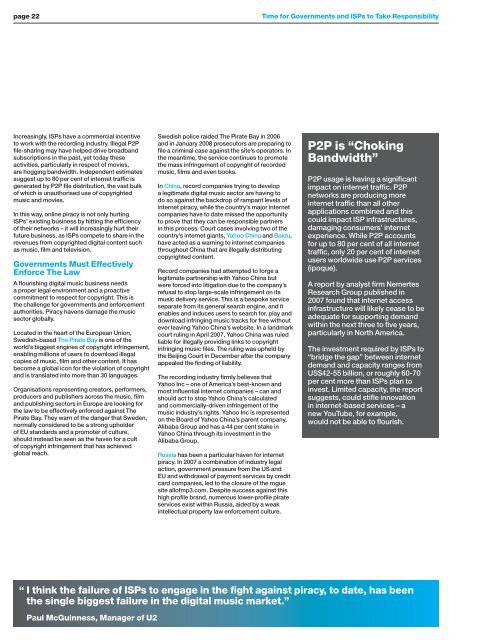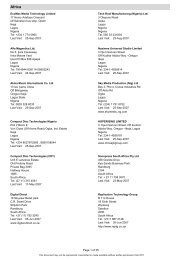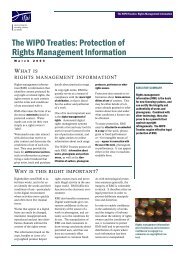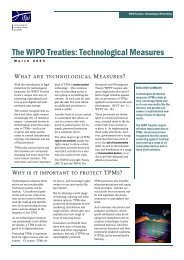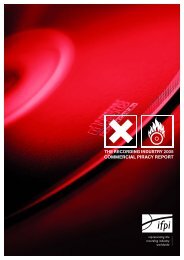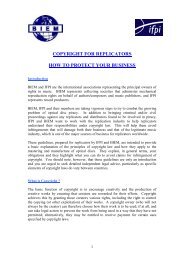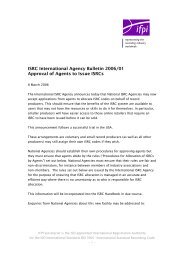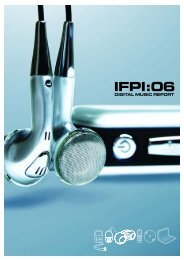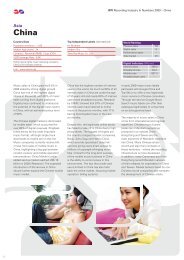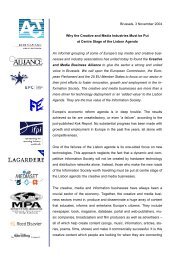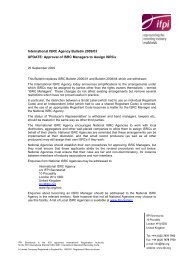Create successful ePaper yourself
Turn your PDF publications into a flip-book with our unique Google optimized e-Paper software.
page 22<br />
Increasingly, ISPs have a commercial incentive<br />
to work with the recording industry. Illegal P2P<br />
file-sharing may have helped drive broadband<br />
subscriptions in the past, yet today these<br />
activities, particularly in respect of movies,<br />
are hogging bandwidth. Independent estimates<br />
suggest up to 80 per cent of internet traffic is<br />
generated by P2P file distribution, the vast bulk<br />
of which is unauthorised use of copyrighted<br />
music and movies.<br />
In this way, online piracy is not only hurting<br />
ISPs’ existing business by hitting the efficiency<br />
of their networks – it will increasingly hurt their<br />
future business, as ISPs compete to share in the<br />
revenues from copyrighted digital content such<br />
as music, film and television.<br />
Governments Must Effectively<br />
Enforce The Law<br />
A flourishing digital music business needs<br />
a proper legal environment and a proactive<br />
commitment to respect for copyright. This is<br />
the challenge for governments and enforcement<br />
authorities. Piracy havens damage the music<br />
sector globally.<br />
Located in the heart of the European Union,<br />
Swedish-based The Pirate Bay is one of the<br />
world’s biggest engines of copyright infringement,<br />
enabling millions of users to download illegal<br />
copies of music, film and other content. It has<br />
become a global icon for the violation of copyright<br />
and is translated into more than 30 languages.<br />
Organisations representing creators, performers,<br />
producers and publishers across the music, film<br />
and publishing sectors in Europe are looking for<br />
the law to be effectively enforced against The<br />
Pirate Bay. They warn of the danger that Sweden,<br />
normally considered to be a strong upholder<br />
of EU standards and a promoter of culture,<br />
should instead be seen as the haven for a cult<br />
of copyright infringement that has achieved<br />
global reach.<br />
Swedish police raided The Pirate Bay in 2006<br />
and in January <strong>2008</strong> prosecutors are preparing to<br />
file a criminal case against the site’s operators. In<br />
the meantime, the service continues to promote<br />
the mass infringement of copyright of recorded<br />
music, films and even books.<br />
In China, record companies trying to develop<br />
a legitimate digital music sector are having to<br />
do so against the backdrop of rampant levels of<br />
internet piracy, while the country’s major internet<br />
companies have to date missed the opportunity<br />
to prove that they can be responsible partners<br />
in this process. Court cases involving two of the<br />
country’s internet giants, Yahoo China and Baidu,<br />
have acted as a warning to internet companies<br />
throughout China that are illegally distributing<br />
copyrighted content.<br />
Record companies had attempted to forge a<br />
legitimate partnership with Yahoo China but<br />
were forced into litigation due to the company’s<br />
refusal to stop large-scale infringement on its<br />
music delivery service. This is a bespoke service<br />
separate from its general search engine, and it<br />
enables and induces users to search for, play and<br />
download infringing music tracks for free without<br />
ever leaving Yahoo China’s website. In a landmark<br />
court ruling in April 2007, Yahoo China was ruled<br />
liable for illegally providing links to copyright<br />
infringing music files. The ruling was upheld by<br />
the Beijing Court in December after the company<br />
appealed the finding of liability.<br />
The recording industry firmly believes that<br />
Yahoo Inc – one of America’s best-known and<br />
most influential internet companies – can and<br />
should act to stop Yahoo China’s calculated<br />
and commercially-driven infringement of the<br />
music industry’s rights. Yahoo Inc is represented<br />
on the Board of Yahoo China’s parent company,<br />
Alibaba Group and has a 44 per cent stake in<br />
Yahoo China through its investment in the<br />
Alibaba Group.<br />
Russia has been a particular haven for internet<br />
piracy. In 2007 a combination of industry legal<br />
action, government pressure from the US and<br />
EU and withdrawal of payment services by credit<br />
card companies, led to the closure of the rogue<br />
site allofmp3.com. Despite success against this<br />
high profile brand, numerous lower-profile pirate<br />
services exist within Russia, aided by a weak<br />
intellectual property law enforcement culture.<br />
Time for Governments and ISPs to Take Responsibility<br />
P2P is “Choking<br />
Bandwidth”<br />
P2P usage is having a significant<br />
impact on internet traffic. P2P<br />
networks are producing more<br />
internet traffic than all other<br />
applications combined and this<br />
could impact ISP infrastructures,<br />
damaging consumers’ internet<br />
experience. While P2P accounts<br />
for up to 80 per cent of all internet<br />
traffic, only 20 per cent of internet<br />
users worldwide use P2P services<br />
(ipoque).<br />
A report by analyst firm Nemertes<br />
Research Group published in<br />
2007 found that internet access<br />
infrastructure will likely cease to be<br />
adequate for supporting demand<br />
within the next three to five years,<br />
particularly in North America.<br />
The investment required by ISPs to<br />
“bridge the gap” between internet<br />
demand and capacity ranges from<br />
US$42-55 billion, or roughly 60-70<br />
per cent more than ISPs plan to<br />
invest. Limited capacity, the report<br />
suggests, could stifle innovation<br />
in internet-based services – a<br />
new YouTube, for example,<br />
would not be able to flourish.<br />
“ I think the failure of ISPs to engage in the fight against piracy, to date, has been<br />
the single biggest failure in the digital music market.”<br />
Paul McGuinness, Manager of U2


